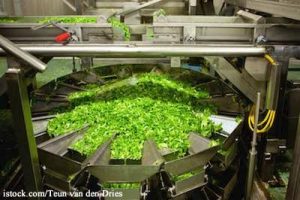When you bring up the subject of food poisoning, most people think of meat or raw eggs. Green salads are usually the last foods we worry about in this regard. But produce is one of the leading carriers of pathogenic bacteria that make people sick. In fact, a report by Center for Science in the Public Interest last fall found that produce is the most common source of food poisoning outbreaks.
 The current Listeria monocytogenes outbreak linked to withdrawn Dole prepackaged salads is a case in point. We heard from many people who started eating salads as part of a program to get healthy. And they were upset and dismayed to discover that they may have been exposed to pathogenic bacteria simply because they ate a salad or two.
The current Listeria monocytogenes outbreak linked to withdrawn Dole prepackaged salads is a case in point. We heard from many people who started eating salads as part of a program to get healthy. And they were upset and dismayed to discover that they may have been exposed to pathogenic bacteria simply because they ate a salad or two.
So what’s the problem? How do Listeria monocytogenes and other bacteria get on our food?
The answer lies in the food distribution system in this country. Because most of the food we buy is grown in far-off fields, then collected and processed at large plants and shipped around the country, contamination in one crop from one field can contaminate food that is sold in many different states. And problems at one plant can be spread throughout the country, as we have seen.

Attorney Fred Pritzker You can contact Fred by calling 1-888-377-8900.
Noted food safety attorney Fred Pritzker said, “Listeria bacteria thrive in cool, moist processing environments. Listeria organisms can also survive cold temperatures. They are capable of forming protective colonies in drains, cracks and crevices which makes this organism particularly difficult to destroy.”
These processing plants use a lot of water to clean and preserve produce. And when water collects in drains and areas around the plant and doesn’t dry out, that’s the perfect environment for Listeria growth. Cleaning systems must be extremely thorough and all parts of the plant must be cleaned often, using tested methods and cleaners.
The government has set zero tolerance for the presence of Listeria bacteria in ready-to-eat foods such as prepackaged salads. These foods do not have a “kill step” of heat, which will kill bacteria, so processors and manufacturers must be very careful to keep the plant’s environment clean. Pritzker added, “it’s not possible to wash away or chemically inactivate all pathogens from leafy greens. Thus, a processor has to actively seek out and destroy Listeria colonies in processing environments in order to prevent food contamination.”
The FDA has issued many guidance documents about the control of Listeria monocytogenes in food production and processing plants. They state that Listeria is widespread in the environment, and can be found in domestic animals, people, raw agricultural commodities, and food processing environments. L. monocytogenes can multiply slowly at refrigeration temperatures. And the bacteria can survive longer under adverse conditions than other pathogenic bacteria. To avoid contamination, good manufacturing practices that establish controls on ingredients, and sanitation must be applied.
Certain foods have a higher risk of supporting the growth of L. monocytogenes. They include raw meat, poultry, seafood, and raw milk, raw produce, and ice. Delis have been the source of food recalls for Listeria and the source for outbreaks in the past. Maintaining clean environments is critical.
So what can you do? First, keep up to date with recalls and other safety notices issued by the FDA and USDA. Second, buy food from reputable retailers who maintain clean stores. And third, when you buy produce, especially prepackaged greens, look for the “sell by” or “use by” date furthest in the future and never buy bags that are torn, or produce that is damaged, bruised, or cut. Always wash produce that is not prepackaged under cool running water, and scrub skins of tougher produce with a clean brush. When you are informed, you can protect yourself and your family and be secure in the knowledge that if someone does get sick, you know what to do.




